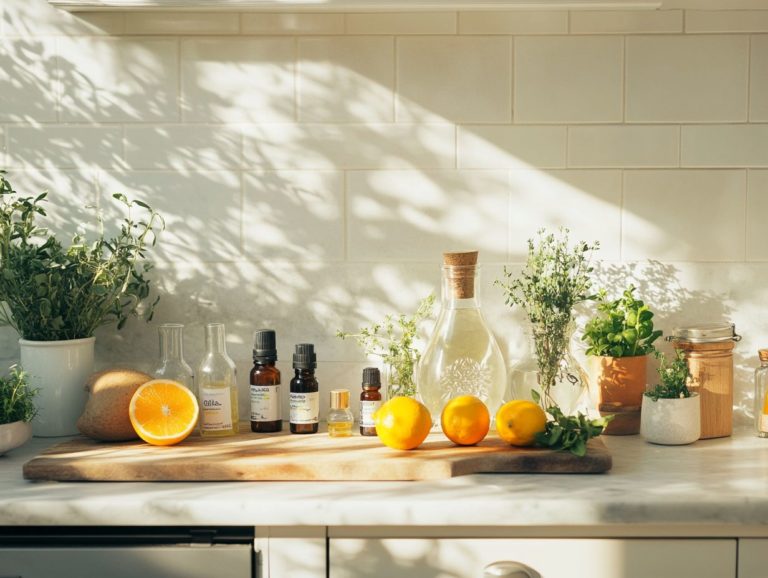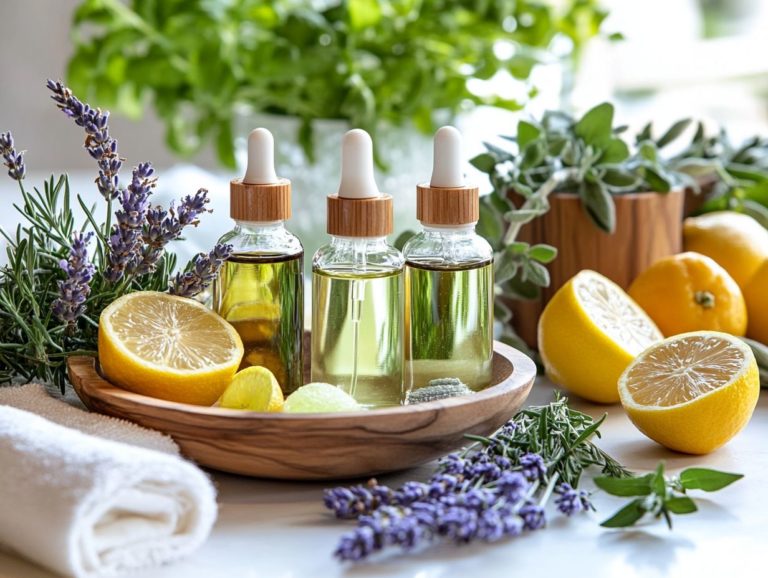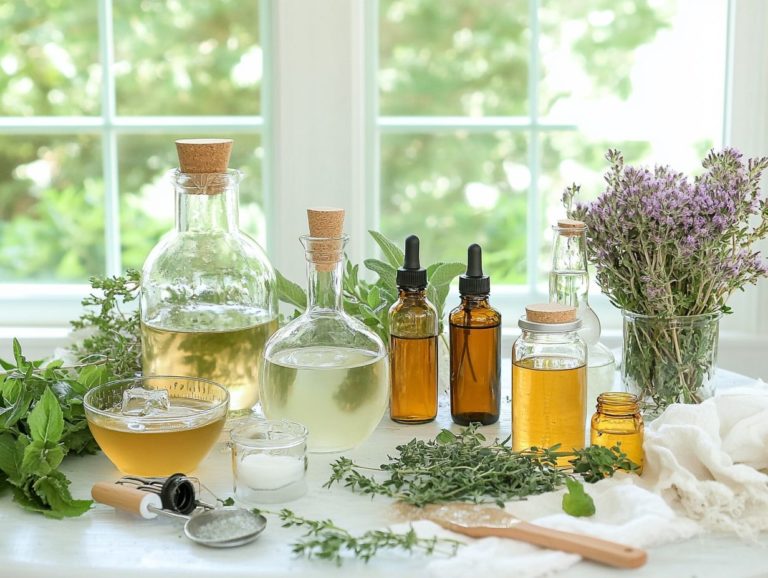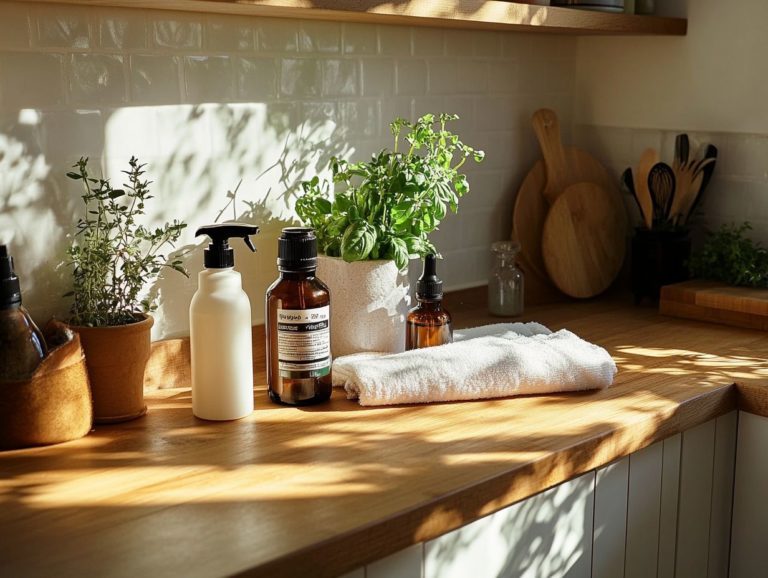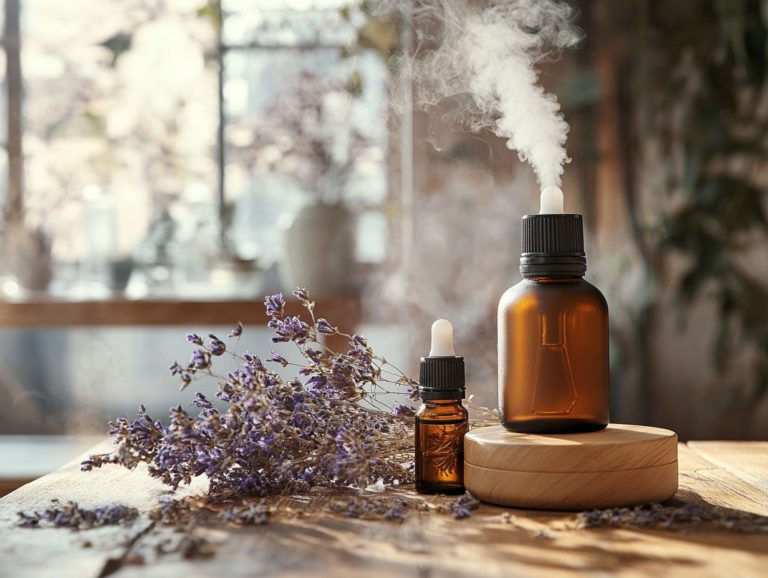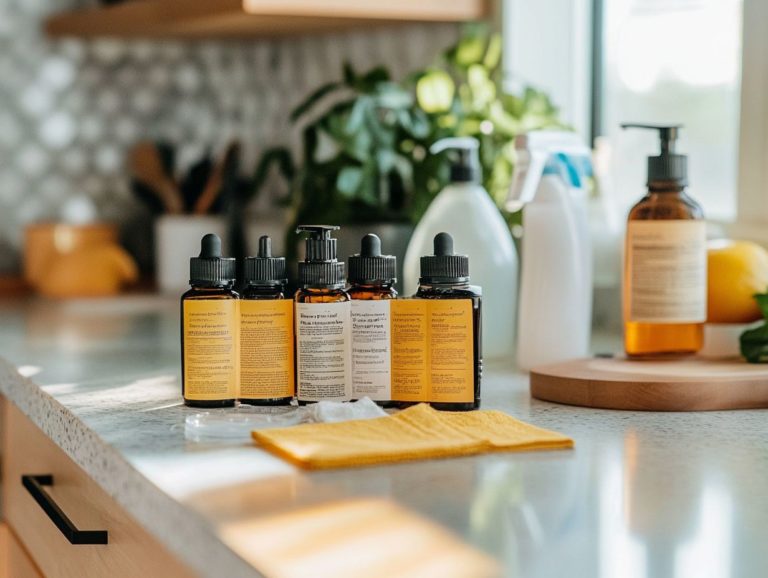Essential Oils for Cleaning: Tips for Beginners
Are you aiming to elevate your cleaning routine to new heights of natural effectiveness? Pure essential oils may just be the perfect addition to your cleaning repertoire, offering enchanting aromas and potent cleansing abilities.
Discover the finest essential oils for cleaning think refreshing lemon and antiseptic tea tree along with practical strategies for their optimal use. Whether you re an experienced enthusiast or just beginning your journey, these insights will empower you to harness the remarkable benefits of essential oils, creating a fresher and healthier home environment. Explore various essential oil brands like Aura Cacia, Now, and Pure Essences to find your perfect match.
Contents
- Key Takeaways:
- What Are the Best Essential Oils for Cleaning?
- How to Use Essential Oils for Cleaning?
- What Are Some Tips for Beginners Using Essential Oils for Cleaning?
- Frequently Asked Questions
- What are essential oils and how can they be used for cleaning?
- Which essential oils are best for cleaning?
- How do I use essential oils for cleaning?
- Are there any safety precautions I should take when using essential oils for cleaning?
- Can essential oils be used for cleaning in place of traditional cleaning products?
- Is it safe to use essential oils for cleaning around pets and children?
Key Takeaways:
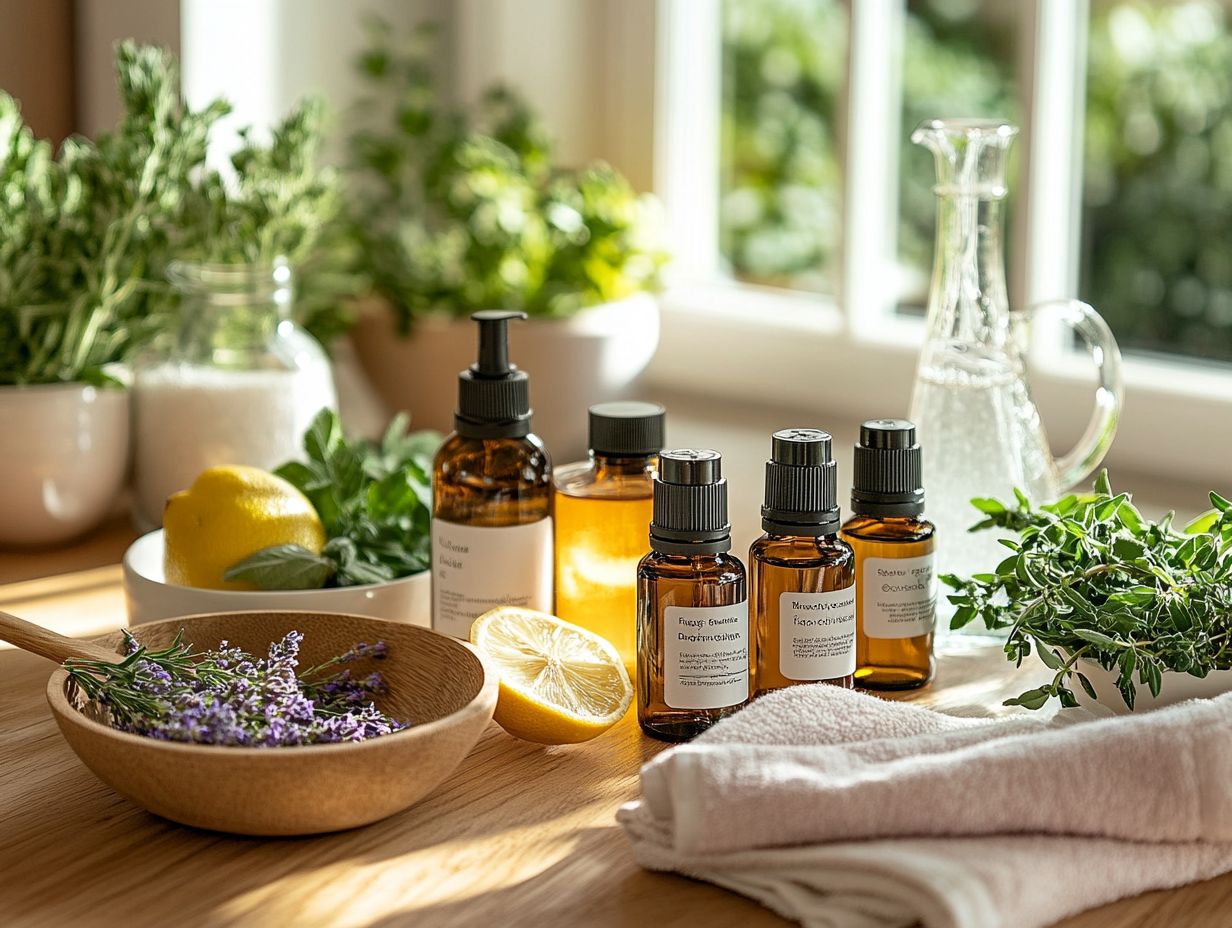
- Start small and experiment with different cleaning essential oils to find which ones work best for your cleaning needs.
- Dilute essential oils with water or use them in DIY cleaning solutions to create natural and effective cleaning products. You can find recipes and essential oil uses online or in health food stores.
- Always use high-quality essential oils and do your research to ensure safe and effective use for cleaning purposes.
What Are the Best Essential Oils for Cleaning?
Understanding the best essential oils for cleaning is crucial for anyone aiming to create a healthier home. Among the most popular and effective options are lemon essential oil, tea tree essential oil, and lavender essential oil. Each is celebrated for its antibacterial properties and delightful fragrances. Eucalyptus essential oil and orange essential oil provide health benefits and potent aromas as well.
These essential oils will transform your space and make it feel alive! They also provide remarkable benefits as natural cleaning agents, making them perfect for your DIY cleaning endeavors. As you explore various essential oil brands, you’ll discover that blending these pure oils can yield potent cleaning solutions that are safe for your home and gentle for your pets.
1. Lemon Essential Oil
Lemon essential oil is celebrated for its invigorating scent and remarkable properties, making it a distinguished choice among natural cleaning products.
This exceptional oil not only elevates your mood with its zesty aroma but also possesses powerful antibacterial and antiviral qualities that can effectively eliminate harmful germs and bacteria in various settings. Whether you’re sprucing up the kitchen or freshening the bathroom, incorporating lemon essential oil into your cleaning routine enhances cleanliness while leaving behind a delightful fragrance.
You can mix it with vinegar and water to create a formidable surface cleaner, or combine it with baking soda for a natural scrub that tackles even the toughest stains. By adding lemon oil to a spray bottle filled with distilled water, you ll craft an outstanding all-purpose cleaner that both disinfects and refreshes your home.
2. Tea Tree Essential Oil
Tea tree essential oil stands out as an exceptional natural disinfectant, renowned for its powerful antibacterial properties, making it the perfect companion for your cleaning routines.
This versatile oil helps you eliminate harmful bacteria and viruses, showcasing antifungal and antiviral characteristics. It is a formidable ally in your quest for a clean and healthy environment. When you incorporate it into your daily cleaning, you ll find it effectively combats mold, mildew, and unpleasant odors.
To truly harness the full potential of this essential oil, consider mixing it with lemon or lavender. This combination enhances its cleansing power and infuses your space with a delightful aroma. Such essential oil combinations can be found in many essential oil recipes and DIY cleaning solutions.
For surface cleaning, simply add a few drops to a spray bottle filled with water and naturally sourced vinegar. This concoction creates an effective multi-surface cleaner, leaving every corner of your home not just clean but invigorated as well.
3. Lavender Essential Oil
Lavender essential oil is renowned not just for its calming aroma but also for its many benefits as both a cleaning agent and an air freshener.
This versatile oil infuses tranquility into your home while efficiently combating dirt and germs. It makes a perfect companion for your DIY cleaning solutions. By combining it with other essential oils like lemon or tea tree, you can create a delightful synergy that elevates the scent profile and amplifies the overall cleaning power of your homemade products.
When you incorporate lavender into your natural cleaners, it works wonders to neutralize unpleasant odors. It fosters a soothing atmosphere, transforming mundane chores into a more enjoyable experience. Embracing lavender in your cleaning routine invites a sense of relaxation and wellness into your daily life.
How to Use Essential Oils for Cleaning?
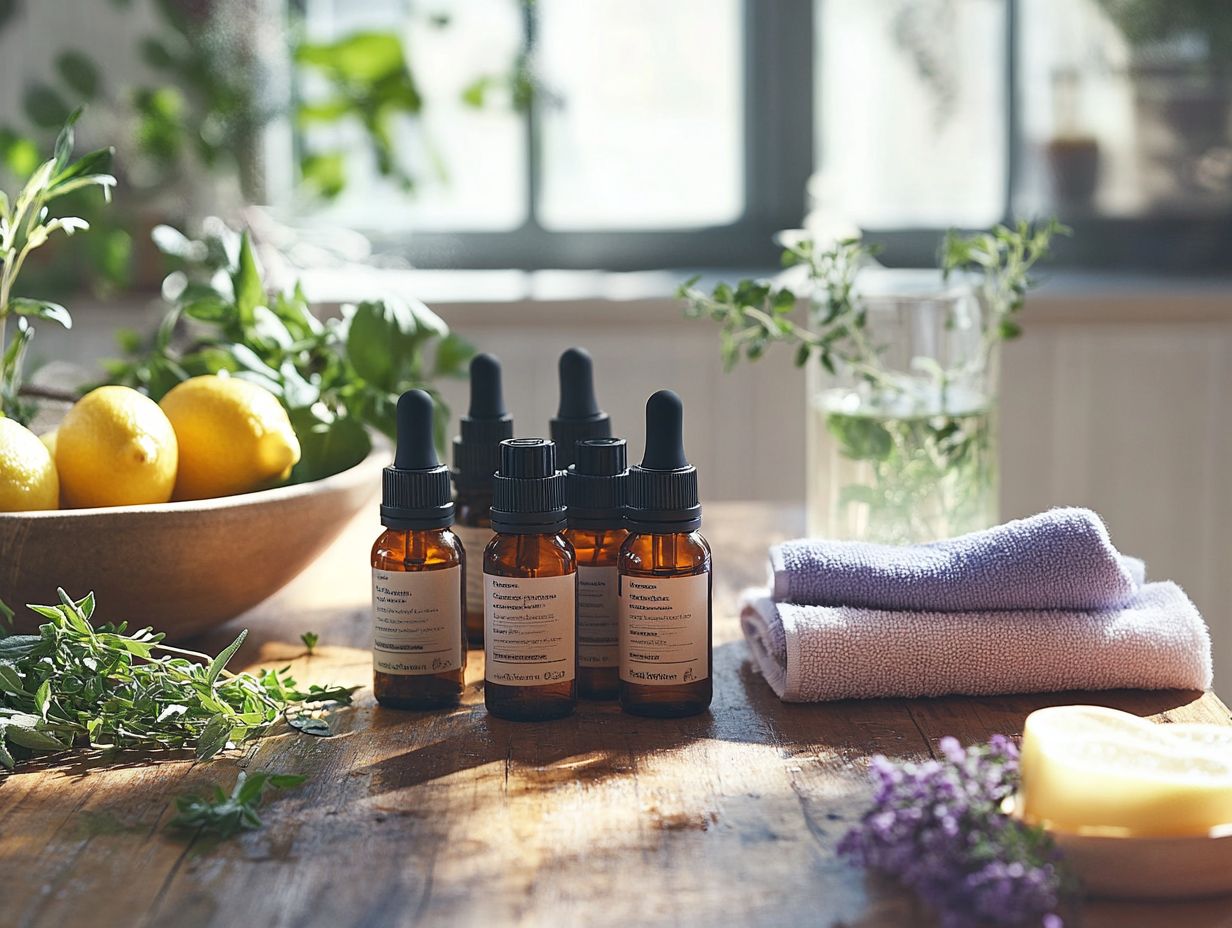
Understanding essential oil cleaning methods is crucial to making the most of their natural properties. From essential oil diffusers to essential oil cleaning recipes, there are many ways to incorporate these natural wonders into your routine.
Utilizing essential oils for cleaning can elevate your home into a serene haven of cleanliness and tranquility. This can all happen while fostering a healthy environment. The methods you can employ are not only simple but also enjoyable.
From essential oil extraction to creating DIY cleaners, the journey can be both educational and rewarding. A highly effective approach involves diluting essential oils with water to craft your own DIY cleaners. This gives you the freedom to customize your cleaning experience according to your unique preferences.
Experimenting with different essential oil combinations can create delightful fragrances and potent cleaning solutions that are both effective and safe for your family and pets.
1. Dilute with Water
Act now to create a safe yet powerful cleaning solution by diluting essential oils with water. This is among the most straightforward and effective methods.
Understanding proper mixing ratios is essential for both effectiveness and safety. For light cleaning tasks think wiping down countertops or freshening up natural fabrics a 1% dilution works wonders, translating to about six drops of essential oil per ounce of water.
When tackling more demanding jobs, such as disinfecting bathroom surfaces, consider ramping it up to a 3% dilution, using roughly 18 drops per ounce of water.
And here s a crucial tip: when you prepare your homemade cleaning sprays, remember to shake the mixture well before each use. This ensures an even distribution of the oils, resulting in a more effective and safe cleaning experience. Essential oil dilution is crucial for both safety and potency.
2. Use in DIY Cleaning Solutions
Dive into the fun of creating your own DIY cleaning solutions! Using essential oils can be an enjoyable and fulfilling endeavor, allowing you to tailor your cleaning products to meet your specific needs and tastes.
By skillfully blending various natural ingredients, you can develop formulas that tackle tough grime and odors while fostering a healthier environment in your home.
The inclusion of essential oils like lavender, tea tree, or citrus not only adds a delightful fragrance but also harnesses their antibacterial and antifungal properties, transforming them into invaluable allies in your cleaning repertoire.
When selecting essential oils, it s crucial to choose high-quality options from health food stores, as these tend to be purer and more concentrated.
Understanding which oils excel in specific cleaning tasks such as lemon for cutting through grease or eucalyptus for disinfecting can significantly enhance the effectiveness of your homemade cleaning solutions.
What Are Some Tips for Beginners Using Essential Oils for Cleaning?
Get ready to transform your cleaning routine with the magical power of essential oils! As you embark on your journey into the world of essential oils for cleaning, understanding how to use essential oils safely and best practices is paramount. This understanding will enable you to fully harness their benefits while minimizing any potential risks. Make sure to follow essential oil precautions and conduct thorough essential oil research to maximize their efficacy.
Beginning with small quantities is a prudent strategy, allowing you to assess both the effectiveness and aroma without inundating your environment. Consider referencing essential oils for cleaning to prioritize high-quality oils and familiarize yourself with proper storage techniques to ensure their potency and effectiveness remain intact in your cleaning routines.
1. Start with Small Amounts
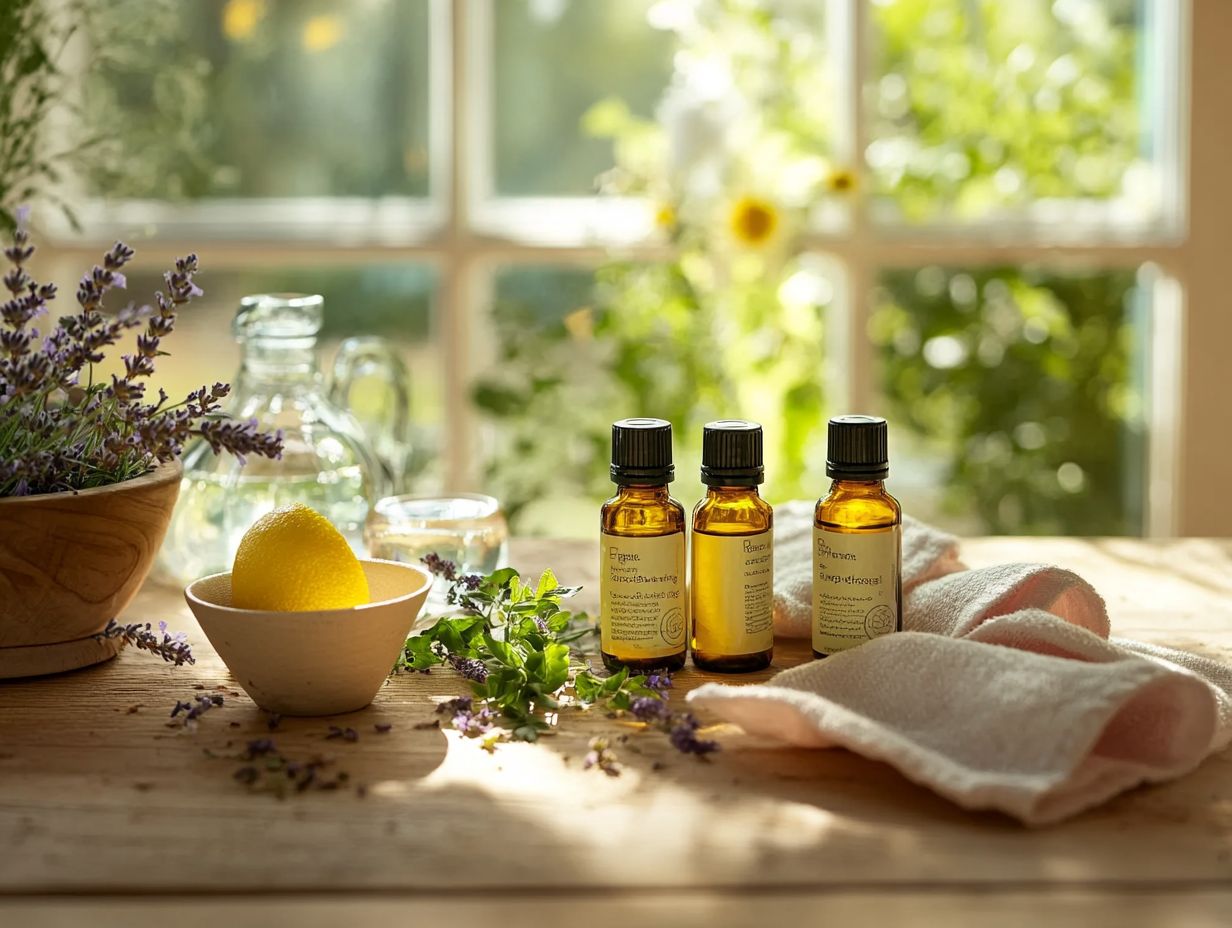
Starting with small amounts of essential oils is wise when you re just beginning, as it helps prevent overwhelming scents and potential sensitivities. This is especially important when using concentrated essential oils, which can be very potent.
This gradual approach allows you to gauge your reactions and determine if you have any allergies or sensitivities to specific oils, which might show up as skin irritations or respiratory discomfort. For example, when using essential oils for cleaning, you can begin by adding just a few drops to a standard-sized spray bottle filled with water, ensuring that the aroma remains pleasant and not overpowering. Many DIY cleaners benefit from the inclusion of these concentrated essential oils for both their effectiveness and pleasant aroma therapy benefits.
This method not only helps create an enjoyable environment but also gives you the flexibility to make adjustments for future uses, fostering a safe and delightful experience as you explore the benefits of these natural scents and pure essential oils.
2. Use High-Quality Essential Oils
Using high-quality, pure essential oils is essential for achieving the cleaning results you desire while ensuring safety during use. Brands like Aura Cacia, Simply Earth, and Pure Essences are renowned for their commitment to quality.
When selecting oils for your cleaning endeavors, it s imperative to source them from reputable brands and retailers that prioritize quality. Brands like Aura Cacia and Now offer pure essential oils that not only enhance the effectiveness of your cleaning routine but also reduce the likelihood of adverse reactions. To identify these oils, look for key indicators such as the country of origin, botanical name, and packaging that clearly states purity levels.
By investing in superior quality oils, you unlock numerous benefits, including an impressive scent throw, enhanced antibacterial properties, and a lasting impact that transforms your cleaning sessions into enjoyable and efficient experiences. Additionally, lemon essential oil and tea tree essential oil are particularly known for their excellent antibacterial properties.
3. Add to Laundry
Adding essential oils to your laundry routine can truly elevate the freshness of your clothes while adding antibacterial properties that are hard to beat. These natural fragrances not only enhance the scent of your fabrics but also provide a more eco-friendly alternative to conventional laundry products, which often rely on harsh chemicals.
To seamlessly integrate essential oils into your wash, it’s wise to first dilute them with a carrier oil (a neutral oil used to dilute essential oils) or mix them with a solution of water and vinegar. This ensures an even distribution throughout your laundry. For cotton and linen, blends of lavender and lemon create a revitalizing aroma, while a combination of tea tree and eucalyptus works wonders on bed linens and towels, leaving them with a clean, crisp feel.
By choosing essential oils, you don t just enjoy a delightful scent; you also contribute to a healthier environment, steering clear of the potential pitfalls associated with synthetic fragrances. Opting for organic essential oils further ensures that you re making a safer, more eco-friendly choice.
Don t miss out on the chance to enjoy a fresher home while protecting your health! Try these tips today for a cleaner and more pleasant living space.
3. Do Thorough Research
Conducting thorough research on essential oils is essential for understanding their applications and ensuring you use them effectively in your cleaning routines.
Essential oils such as lavender, eucalyptus, and orange have unique properties that can be highly beneficial in various cleaning methods.
By exploring the unique properties of various essential oils, you can uncover which ones provide the most germ-fighting properties and delightful fragrances.
Engaging with reputable resources such as scientific journals, online courses, or comprehensive blogs will offer you valuable insights into the fascinating world of essential oils.
Connecting with communities on social media or wellness forums can enrich your knowledge and help you discover practical tips for incorporating these natural wonders into your daily cleaning tasks.
Don’t forget to check sources like Amazon and health food stores for high-quality essential oils.
Embracing essential oils not only creates a healthier home environment but also transforms the mundane act of tidying up into a delightful aromatic experience.
Make sure to choose pet-safe essential oils today to protect your furry friends while you clean!
Watch the video above to learn more about using essential oils for cleaning.
Frequently Asked Questions
What are essential oils and how can they be used for cleaning?
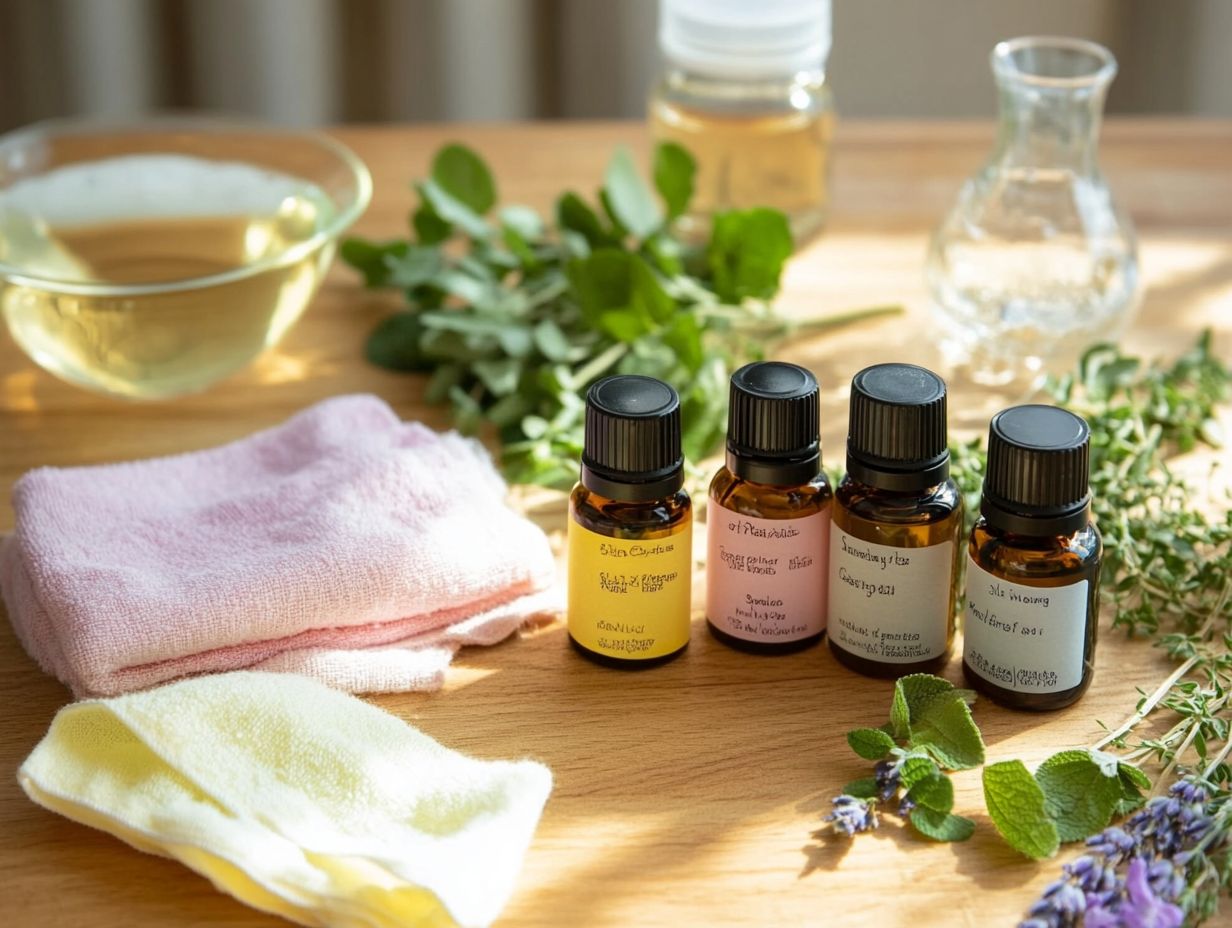
Essential oils come from plants and pack a powerful cleaning punch! They have natural cleaning properties and can be used in various ways, such as creating DIY cleaning products and adding them to laundry detergent.
For instance, essential oil cleaning recipes often include lemon essential oil and tea tree essential oil for their antibacterial properties.
Which essential oils are best for cleaning?
Some of the best essential oils for cleaning include lemon essential oil, tea tree essential oil, peppermint, lavender, and eucalyptus.
These oils have strong antimicrobial and antiseptic properties, making them effective for disinfecting and deodorizing surfaces.
Additionally, orange essential oil is also highly regarded for its aromatic and cleansing properties.
How do I use essential oils for cleaning?
Essential oils can be added to homemade cleaning solutions, laundry, or used in a diffuser for air purification.
You can even use them as a natural air freshener by adding a few drops to a spray bottle filled with water.
Useful essential oil blends can be created for specific purposes, such as combining eucalyptus essential oil and lavender essential oil for a soothing, clean scent.
Are there any safety precautions I should take when using essential oils for cleaning?
Yes! Always dilute essential oils before using them for cleaning, as they can be too strong in their undiluted form.
Also, do a patch test before using any essential oils on surfaces to ensure they do not cause any damage.
Proper essential oil storage and essential oil dilution are key to maintaining their potency and effectiveness.
Can essential oils be used for cleaning in place of traditional cleaning products?
Essential oils can be a natural alternative to traditional cleaning products, but they may not always be as effective.
It’s best to use a combination of essential oils and traditional cleaning products for a thorough clean.
Exploring essential oil cleaning solutions and applications can help you find the right balance.
Is it safe to use essential oils for cleaning around pets and children?
Wondering if you can clean safely with essential oils around your loved ones? The answer is yes, but it is crucial to use caution and always dilute the oils properly.
Some oils may harm certain animals and children with sensitive skin. Check reliable sources before adding them to your cleaning routine.
Choose organic essential oils and refer to safety guidelines for a safer cleaning experience.

